5 Healthiest Cream Cheeses on Grocery Shelves—and 3 To Avoid
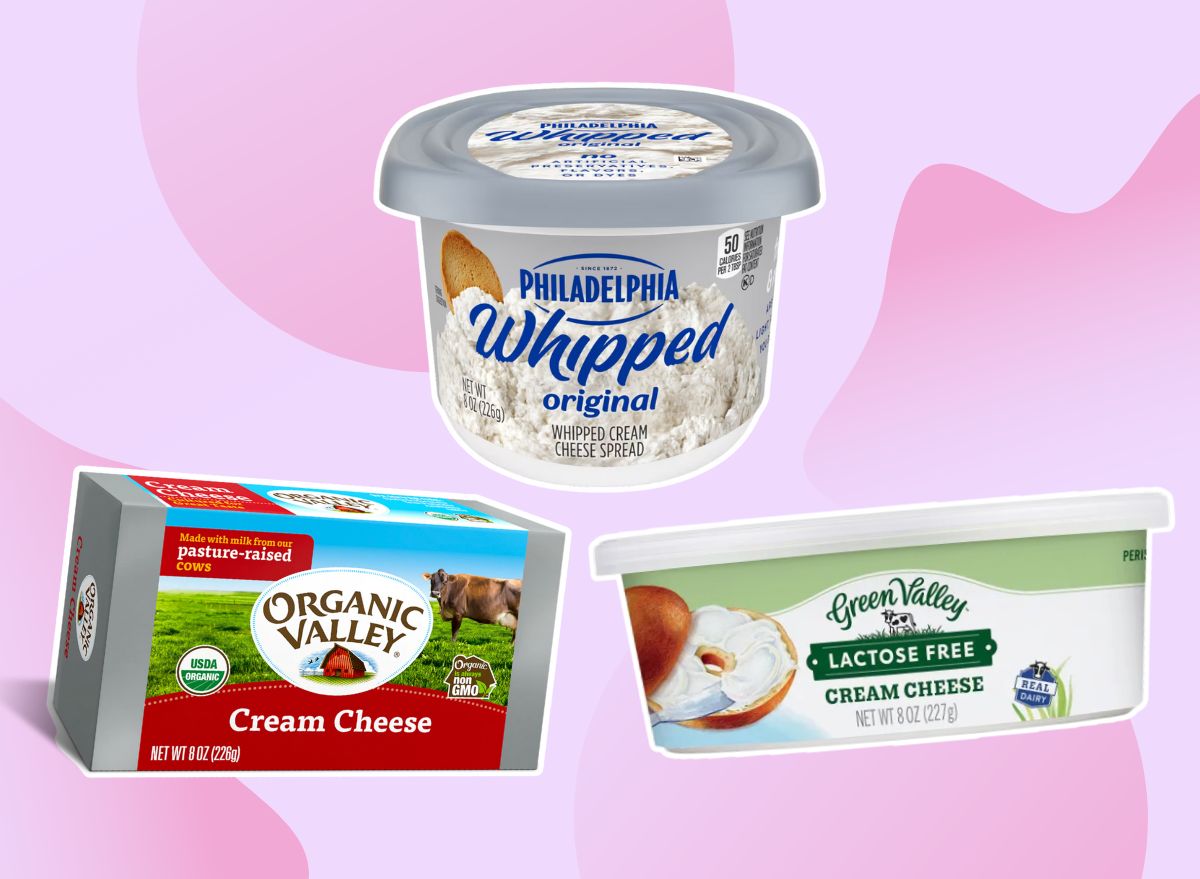
Since its debut in the 1870s, cream cheese has taken America by storm with its mild, almost sweet taste and its versatile texture that goes great on anything from your morning bagel to your pound cake dessert (and don't forget the cream cheese frosting, too). Great with jelly or savory toppings like smoked salmon, cream cheese is in a category of its own due to the fact that, unlike Brie and Neufchâtel cheeses, cream cheese is not a "mature" cheese and therefore needs to be eaten fresh.
But not all cream cheeses are created equally. While some varieties are made with simple, nutritious ingredients, others are easily diluted with lower-quality ingredients to preserve their shelf life, attract consumers, and even stabilize (aka, hold together) the variable ingredients found therein. Cream cheese has, in some cases, strayed far from its humble roots of mere milk and cream and, as with other items on grocery shelves, has become a conglomeration of ingredients that are, well, not even dairy-based.
In recent years, however, many better-for-you brands have taken on the Herculean task of bringing food back to its original roots, and cream cheese is no exception. Even so, lower-quality products still dominate grocery store shelves, especially specific categories that claim to be "diet" or "low-fat." This can all be quite hard to navigate as you wander grocery store shelves. To help you decide which brand is right for you and your family, we've mandated three strict criteria to choose the healthiest cream cheeses on the market that steer clear of low-quality ingredients without sacrificing taste.
How We Chose the Healthiest Cream Cheeses:
- No added sugars: As with so many foods on grocery store shelves, added sugar has a way of sneaking in unbidden in an effort to get consumers hooked; therefore, Americans are eating far too much added sugar without even realizing it. According to the American Heart Association, Americans are eating upwards of 17 teaspoons of added sugar per day – more than 2-3 times the recommended daily amount. It's recommended that the average, healthy female should eat no more than 25 grams of added sugar per day, while males should aim for about 36 grams per day. And even cream cheeses, as innocuous as they initially seem, may be a contributing culprit. Therefore, we have ensured that all cream cheeses on our high-quality list are free from added sugars.
- No artificial sweeteners, colors, or flavors: We don't want to fearmonger when it comes to artificial ingredients including flavoring, sweeteners, or coloring. There is quite a lot of conflicting evidence about whether or not artificial additives are harmful to the body. Although scientists, registered dietitians, and other professionals are still debating this hot topic, we've decided to keep things simple by foregoing all artificial flavors, sweeteners, and colors to get back to the basics. Cream cheese is simply that – creamed cheese. Therefore, we don't see a place for artificial ingredients in cream cheese, especially when so many better-for-you brands are going without.
- Lower sodium: All across the cheese spectrum, many brands dump in sodium to enhance overall taste. However, a little bit of salt goes a long way, and we made sure that all our high-quality cream cheese brands contain 115 milligrams or less of sodium per serving. Like added sugar, sodium is eaten in excess in America, with the average adult eating over 3,400 milligrams per day, according to the FDA. As sodium is a direct contributor to health issues such as hypertension (high blood pressure) and heart disease, it's critical to keep your daily sodium intake under 2,300 milligrams per day.
Read on to learn about the healthiest cream cheeses you can find on grocery shelves, as well as a few varieties we recommend avoiding. Then, check out The 5 Healthiest Store-Bought Bagels—and 5 To Avoid.
Healthiest Cream Cheeses
Best: Philadelphia Whipped Cream Cheese Spread
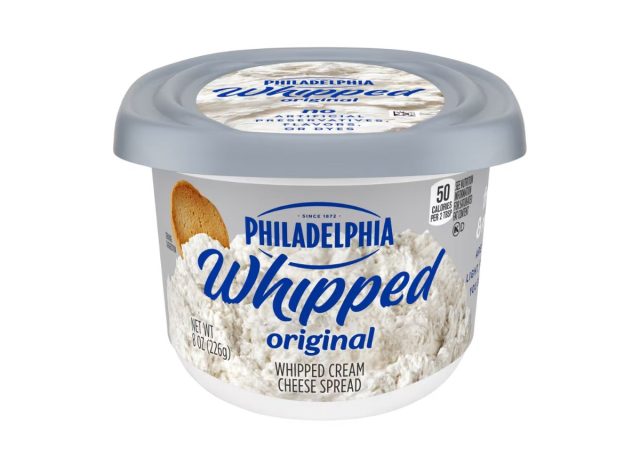
Calories: 50
Fat: 4.5 g (Saturated fat: 2.5 g)
Sodium: 95 mg
Carbs: 2 g (Fiber: 0 g, Sugar: 1 g)
Protein: 1 g
For those of us who like to go a little crazy with cream cheese, Philadelphia's Whipped Cream Cheese Spread may be a healthier option as it's fluffier, easily spreadable, and may help your brain recognize that there's enough cream cheese on your bagel to keep you satisfied thanks to its greater overall volume. With only 2.5 grams of saturated fat per serving, 50 calories, and no added sugar, this is a simple, no-frills cream cheese that's sure to satisfy your morning craving.
Best: Organic Valley Cream Cheese
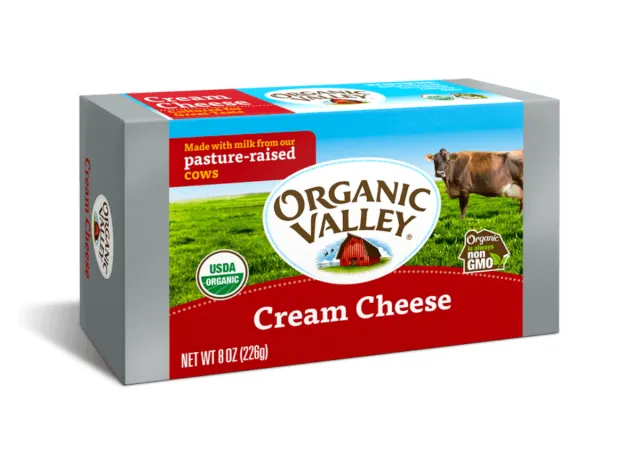
Calories: 110
Fat: 10 g (Saturated fat: 6 g)
Sodium: 100 mg
Carbs: 2 g (Fiber: 0 g, Sugar: <1 g)
Protein: 2 g
With no added sugar, antibiotics, synthetic hormones, pesticides, or GMOs, Organic Valley's Cream Cheese is a great choice for those who want high-quality cream cheese. Widely available at most grocery stores, this cream cheese is 100% USDA-organic and contains only four ingredients. Additionally, this cream cheese contains 6% of your daily Vitamin A needs, which is higher than most other brands on the market. Vitamin A is an essential nutrient that aids in a slew of bodily functions including both the immune system and maintaining healthy vision.
Best: Miyoko's Creamery Plant Milk Cream Cheese
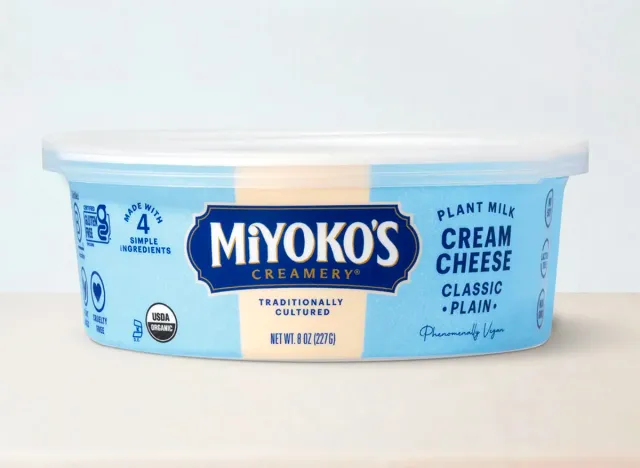
Calories: 90
Fat: 8 g (Saturated fat: 2.5 g)
Sodium: 115 mg
Carbs: 4 g (Fiber: 1 g, Sugar: 1 g)
Protein: 3 g
For those following a dairy-free or vegan diet, Miyoko's Creamery creates a top-tier Plant Milk Cream Cheese that is just as creamy, flavorful, and healthy as traditional dairy brands. With no added sugars and 3 grams of protein, this cream cheese is made with only four easy-to-read ingredients, including organic cashew milk, organic coconut cream, sea salt, and cultures. This cream cheese is also gluten-free and can be used as a substitute in any of your dairy-free baking needs.
Best: Green Valley Organic Lactose-Free Cream Cheese
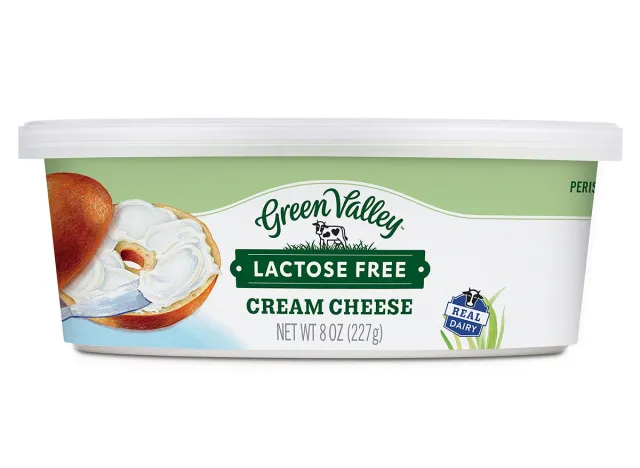
Calories: 90
Fat: 10 g (Saturated fat: 6 g)
Sodium: 75 mg
Carbs: 1 g (Fiber: 0 g, Sugar: 1 g)
Protein: 1 g
Green Valley's Lactose-Free Cream Cheese is 100% USDA-certified organic and is friendly on sensitive tummies. This cream cheese has many other certifications, such as FODMAP-friendly, gluten-free, and kosher, and it's made with only four wholesome ingredients: pasteurized cultured cream (milk), lactase enzyme (an enzyme to help aid in the breakdown of lactose), sea salt, and live and active cultures. Plus, we love that there are only 75 milligrams of sodium, as the American Heart Association recommends no more than 2,300 milligrams of sodium per day for the average, healthy adult.
Best: Nancy's Organic Cultured Cream Cheese
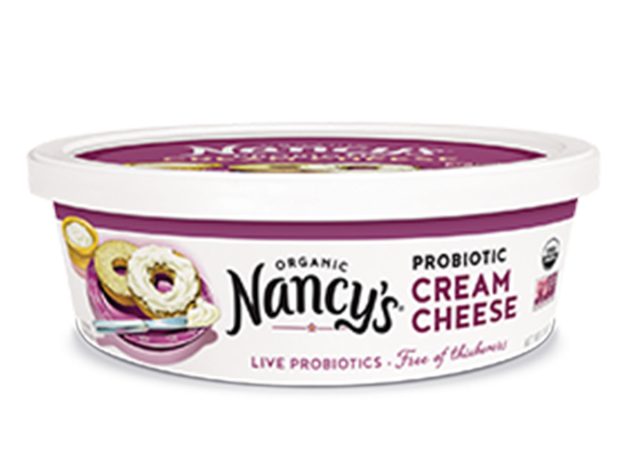
Calories: 110
Fat: 10 g (Saturated fat: 6 g)
Sodium: 40 mg
Carbs: 2 g (Fiber: 0 g, Sugar: 1 g)
Protein: 1 g
Probiotic cream cheese? Count us in! Nancy's Organic Cultured Cream Cheese (as well as their non-organic line) contains only four ingredients – cream, nonfat milk, salt…and four strains of active, live probiotic cultures. Probiotics are live bacteria that aid in balancing the gut microbiome and, therefore, help stave off gut-related illnesses, including dysbiosis or the loss of diversity in your gut flora. If you're interested in getting some probiotic goodness, Nancy's cream cheese may just be the way to go.
Unhealthiest Cream Cheeses
Worst: Philadelphia Brown Sugar and Cinnamon Cream Cheese
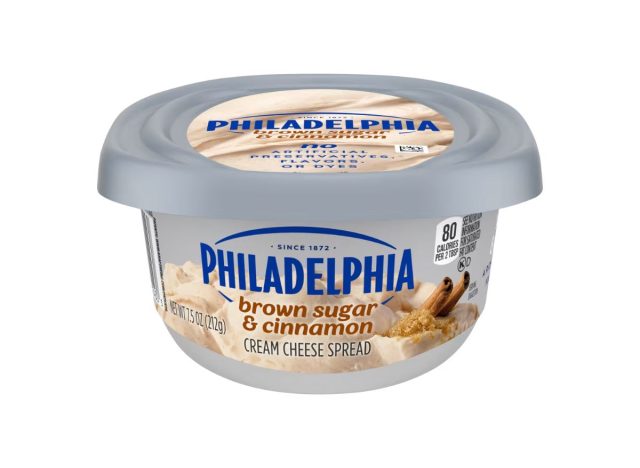
Calories: 80
Fat: 4.5 g (Saturated fat: 3 g)
Sodium: 100 mg
Carbs: 7 g (Fiber: 0 g, Sugar: 7 g)
Protein: 2 g
It probably doesn't come as much of a surprise that one of the unhealthiest cream cheeses on the market is Philadelphia's Brown Sugar and Cinnamon Cream Cheese. This cream cheese contains 7 grams of added sugar, which is more than what you get when you eat three Jolly Rancher candies. Instead of reaching for sugar-filled cream cheese, consider choosing a no-sugar-added option and sprinkling some cinnamon atop for an extra flavor kick. Cinnamon contains no sugar and may aid in heart health as it naturally lowers levels of "bad" cholesterol while maintaining the "good."
Worst: Philadelphia Smoked Salmon Cream Cheese
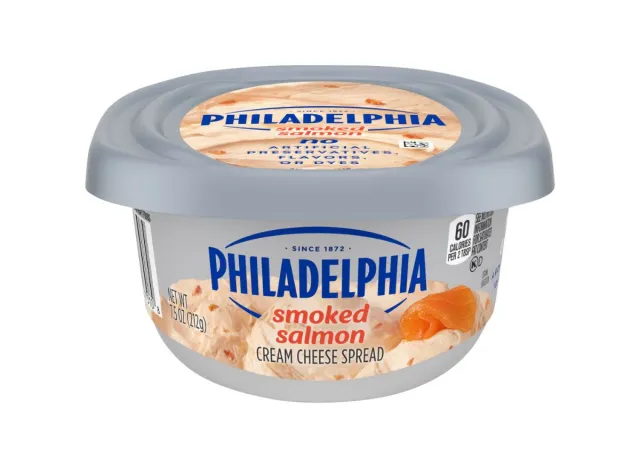
Calories: 60
Fat: 5 g (Saturated fat: 3.5 g)
Sodium: 190 mg
Carbs: 2 g (Fiber: 0 g, Sugar: 2 g)
Protein: 3 g
While this Philadelphia Smoked Salmon Cream Cheese may seem like the perfect solution for a quick lox breakfast (capers not included), we can't recommend this cream cheese as high-quality since its ingredients list seems dubious. This cream cheese includes "color added" as well as "natural flavors (includes smoke)," neither of which we can definitively put down to a single food source. Although, again, we don't want to fearmonger, we don't see the point in creating cream cheese concoctions that stray so far from their natural roots when better-for-you brands are keeping it real. And, in the end, you'll receive far more protein by adding real smoked salmon to your morning lox bagel.
Worst: Great Value Fat-Free Cream Cheese
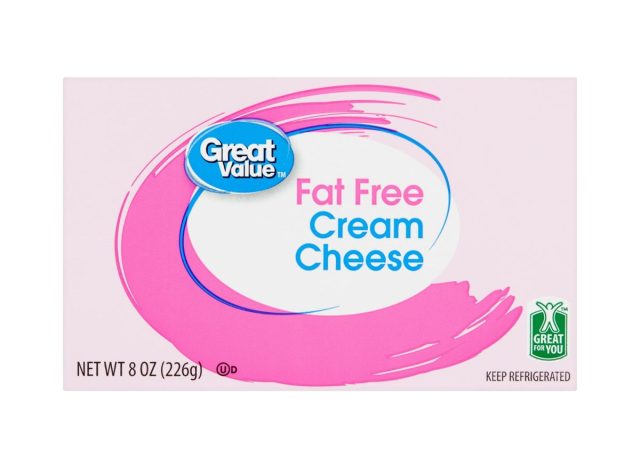
Calories: 30
Fat: 0 g (Saturated fat: 0 g)
Sodium: 190 mg
Carbs: 4 g (Fiber: 0 g, Sugar: 2 g)
Protein: 3 g
Don't be fooled by a "fat-free" label. Just because something is marketed as a diet product doesn't mean that it's any healthier. Great Value's Fat-Free Cream Cheese contains far more fillers and preservatives than other brands, and notably, their label contains a plethora of asterisks that note "[this ingredient] is not found in regular cream cheese" and "[this ingredient] is in excess of the amount allowed in regular cream cheese." Such ingredients included the gray "color added" claim as well as ingredients such as carrageenan, which, although more human studies need to be conducted, may lead to gastrointestinal issues as shown in both in-vitro and animal subjects. All in all, regular cream cheese offers very little fat per serving, so think twice before choosing a fat-free blend.
- Source: https://www.heart.org/en/healthy-living/healthy-eating/eat-smart/sugar/how-much-sugar-is-too-much
- Source: https://www.fda.gov/food/nutrition-education-resources-materials/sodium-your-diet
- Source: https://www.ncbi.nlm.nih.gov/pmc/articles/PMC8470268/
- Source: https://www.ncbi.nlm.nih.gov/pmc/articles/PMC6162863/
- Source: https://www.heart.org/en/healthy-living/healthy-eating/eat-smart/sodium/how-much-sodium-should-i-eat-per-day
- Source: https://pubmed.ncbi.nlm.nih.gov/24019277/









